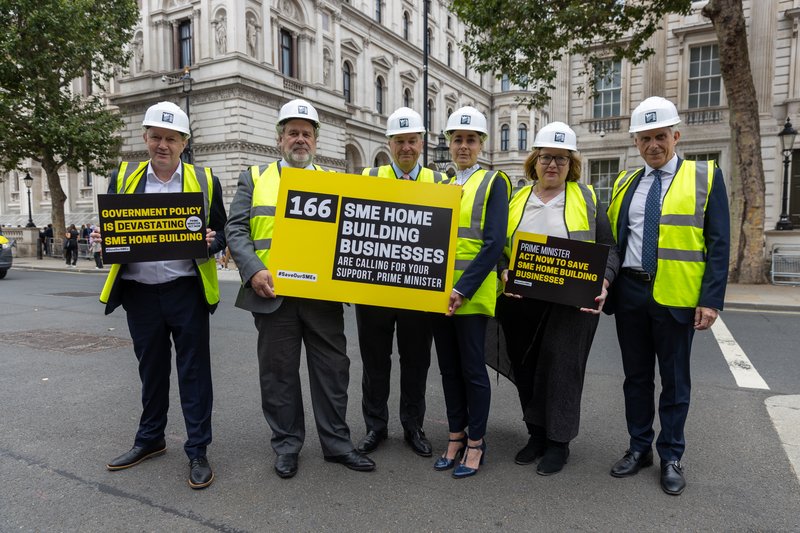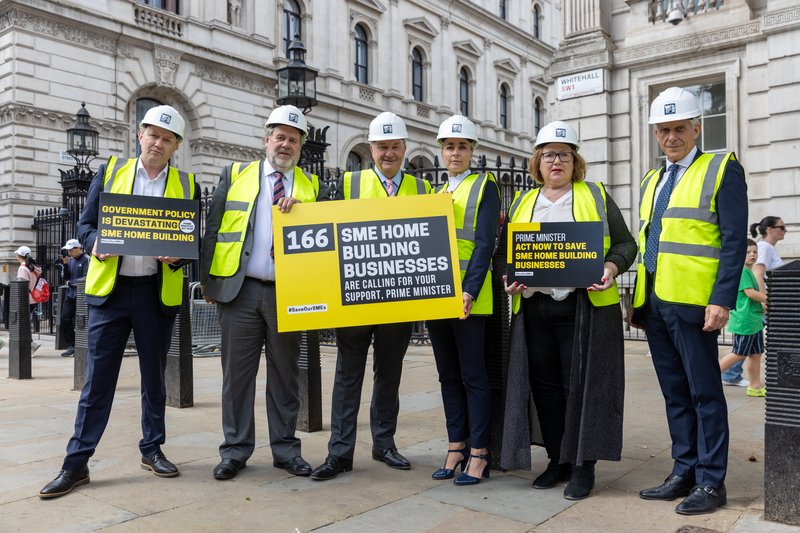SME house builders visit Number 10 to demand action

93% of firms consider scaling back or ‘changing direction’ as Government’s anti-development stance bites
SME housebuilders today (Thursday 6 July) delivered a letter to the Prime Minister calling for action to save their businesses. Nine out of 10 SME house builders are unhappy with the Government’s approach to housing and the letter, signed by almost 200 firms, highlights the existential threat to the survival of businesses posed by the increasingly anti-development policy environment.
It is estimated that there are now 85% fewer small house builders than there was a generation ago, with small building businesses warning that the barriers they face today are greater than ever before. The letter warns that these blocks on development threaten to wipe out a growing number of firms in the coming months and years. A survey of more than 200 SMEs has found 78% are considering scaling back their residential construction activities, while 87% are contemplating a change in business direction, therefore cutting investment in the sector.
Smaller builders are a critical part of the house building industry and, amidst a growing housing crisis, are key to its ability to deliver the homes the country needs. Often regionally based, SME firms tend to focus on smaller sites and play an active role in local communities and their economies, investing in infrastructure and supporting employment through recruitment and training schemes.
The letter, presented at the door to number 10 today, is calling on Government to urgently address areas where recent actions or failing policies are threatening the viability of small builders. These include;
- The collapsing planning process is the number one barrier for SME builders. Cumbersome and inefficient, the process has worsened because of recent unhelpful interventions by the government. Locally, under-resourced local authority planning departments can take years to process applications to the point where work can start. This ties up capital, preventing SMEs operating elsewhere.
- Planning reform. Michael Gove's capitulation on the planning system to an anti-development faction of Conservative MPs led by Theresa Villiers, particularly the removal of mandatory housing targets and a softening of the Five-Year Land Supply Requirement, has now seen 58 local authorities withdraw or pause their Local Housing Plans. The moves will make it even more difficult to obtain planning consent, increasing uncertainty and cost and slow down the prospect of any return on investment.
- Interventions by Government quango Natural England are delaying am estimated 180,000 homes from the Tees Valley to Cornwall. Despite the fact that even Natural England accept the contribution of new housing to the high levels of nutrients is minimal, with agriculture and water company failings by far the main drivers, there are moratoriums on building in 74 local authority areas. Whilst larger builders can focus on sites outside the effected areas, SME builders with their entire portfolio of one or a few sites on hold as a result, are in effect unable to operate and unable to build are forces to lay off longstanding staff or family members. Natural England is also intervening in other areas, citing ‘water neutrality’ and ‘recreational impact zones’ as the reason to impose further bans on development.
- The costs of the growing number of new taxes, regulations and policies are adding at least £20,000 to the cost of building a new home, impacting the financial viability of developments.
- As with other sectors in the economy, rampant inflation, supply chain issues and the challenging economic environment are further driving up costs. Additionally, the government’s anti-development and antibusiness messaging and the ever-changing policy environment makes recruitment increasingly difficult.
Speaking today in Westminster, Stewart Baseley, Executive Chairman of the Home Builders Federation said: “SMEs are the lifeblood of all industries, but in house building we are seeing them being driven out by an increasingly anti-development, antibusiness policy environment. The planning process is grinding to a halt and regulatory costs are rocketing, whilst the nutrient issue has put the brakes on sites across a quarter of the country.
“The impact of this policy approach is devastating for SMEs, and businesses unable to operate or generate an income are laying off staff, or increasingly closing their doors. We are urging Government to act now so that the businesses that remain have a chance of survival.”
Steve Midgley, Managing Director of Fairgrove Homes says: “I truly don’t know how anyone could start these days without substantial investor backing, so anyone without large company experience or a pot of money probably has no chance. We are seriously considering cutting back and reducing what we do if not leaving the industry all together.”
Mark Waite, Head of Planning at Kellen homes says: “We’re a new entrant to the homebuilding industry, focused on brownfield sites. Our direction of travel is entirely aligned with the direction of national policy. We are determined to succeed - and believe we will - but we are needing to tailor our own growth plans to account for the seemingly endless blockages in the system.
Kate Tait, Group Strategic Land and Planning Director at Cameron Homes says: “As a family run regionally-based business, the uncertainty over land supply with planning permission is impacting on our ability to guarantee continuity of work and therefore retain our site based staff, subcontractors and supply chain. Without assurances of where they will be placed next, we risk losing long-serving staff to firms that can offer greater certainty of future work on larger sites. This leaves us in a perpetuating cycle of delays that is hampering our ability to progress and build homes local communities need.”
Steve Morgan, Founder of Redrow plc says: “When Redrow commenced home building as a small SME in the 1980s there were very few barriers to entry. I, and many others, were able to set up building companies from scratch and grow them into large regional or national builders, with all the homes, jobs and economic benefit that came with it.
“From ‘red line’ outline planning permissions, it would take six to eight weeks to get the first spade in the ground. Land was available, planning was pragmatic and finance was relatively easy to source.
“Sadly, the current operating environment and the Government’s anti-building stance makes it virtually impossible for today’s generation of SMEs to succeed. The country needs SME builders and the homes they are capable of supplying. However, the wall of bureaucracy in the system is completely stacked against them. I implore ministers not to turn their backs on the hard-working, aspiring business owners of this country, before it is too late!”
A recent survey of SME housebuilders found that 92% of those polled say they do not feel the government’s approach to planning or housing was positive, and call on Ministers to take action if it is to avoid seeing supply levels fall. The SME State of Play Report showed that;
- Securing and processing planning permission to the point where construction work can start is the major barrier to growth according to 93% of SME developers.
- The availability of land is a major issue for 52% of SME builders.
- 76% believe Local Authority staffing shortages are the main cause of delays in the process.
- Rising material (99%) and energy (88%) costs are a major concern for companies.
- Over two-thirds are impacted by the ‘nutrients’ issue that is restricting development in more than a quarter of England’s local authority areas.
To find out more about our Save Our SMEs campaign and to show your support by signing our letter visit our Save Our SMEs campaign page.
ENDS
For media enquiries or to arrange an interview, contact media@hbf.co.uk or Steve Turner on 07919 307760 or steve.turner@hbf.co.uk
Notes to Editors:
- The Home Builders Federation (HBF) is the principal representative body for private sector home builders and voice of the home building industry in England and Wales. HBF member firms account for some 80% of all new homes built in England and Wales in any one year, and include companies of all sizes, ranging from widely-recognised national firms, through regionally based businesses and small local companies: hbf.co.uk



